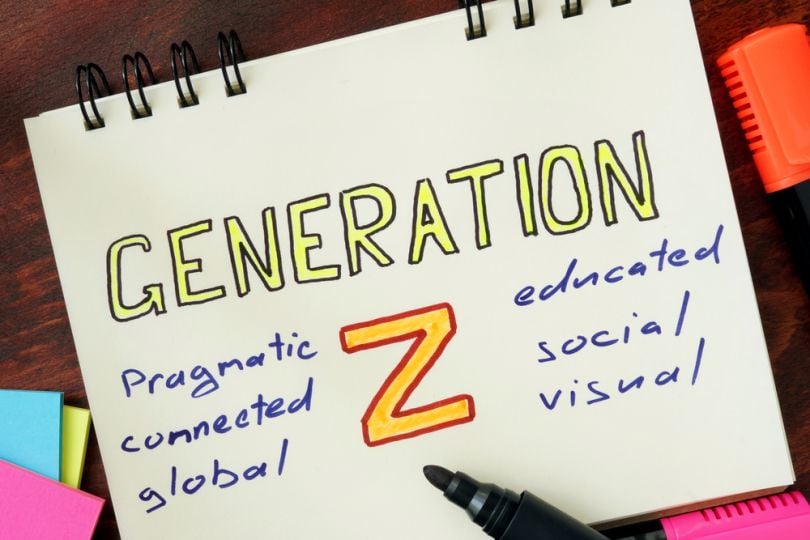Each generation is defined by a shared set of experiences, beliefs and interests. They have unique nuances that are best understood by those among it, making it difficult for older generations to relate to the rising age group and vice versa.
As Generation Z makes its way into the workforce, millennials, Gen X and Baby Boomers are scrambling to understand their behaviors and beliefs in order to recruit and retain this young talent. To help you get started, we’ve broken down the basics of what makes Generation Z unique and how you can prepare for their place in the workforce. Feel free to click the links below to skip ahead.
Table of Contents
- Who is Gen Z?
- Traits of Gen Z in the Workforce
- Adjust Core Values to Align with Gen Z Principles
- Tailor Perks and Benefits to Gen Z
- How to Attract Gen Z Candidates
Who is Gen Z?

Members of Generation Z, also known as Gen Z or Post-Millennials, were born roughly between 1997 and 2010. In 2020, they'll be between the ages of 9 and 22 years old. 2019 was the first year Gen Zers who completed a four year college degree started entering the workforce.
Even though they are still fairly young, Gen Zers are already being distinguished as the most educated generation, with 59% of Gen Zers attending college compared to 53% of millennials. Not only that, but they are also the most experienced generation when it comes to technology, having grown up with the internet, social media and personal devices.
They are also by far the most diverse generation, with 48% of Gen Zers identifying as racial or ethnic minorities, compared to 39% of millennials. Generation Z cares about working for companies that value and prioritize creating a genuinely diverse and inclusive workplace — so much so that 77% of Gen Zers report that a company’s diversity efforts affect their decision to accept a job.
See how your employer brand is performing in AI tools like ChatGPT and Google.
Traits of Gen Z in the Workforce

Now that you understand the basic gist of what makes Generation Z distinct from past generations, we're going to dive into the most important traits consistent among Gen Zers in the workforce.
Joining the Workforce
Although much of the generation is still too young to work, trends find that Gen Z is the slowest generation to enter the workforce early in life, with only 58% of Gen Zers ages of 18 to 21 being employed, compared to 72% of millennials within that age group. Therefore, be prepared for Gen Z applicants to not have as much internship or work experience when applying to jobs right out of school.
With the rising cost of higher education, it’s no surprise that only 11% of Gen Zers plan to take on debt to pursue a degree. Not only that, but 75% are considering other paths to employment, like going straight into the workforce. To evolve with the times, you may want to reconsider education requirements in your job descriptions and instead incorporate hard and soft skills testing in the recruitment process.
Career Aspirations
Also, unlike millennials who are stereotyped as incessant job hoppers, Gen Zers are actually much more interested in pursuing long term careers. They see themselves working for an average of just four companies throughout their entire life. However, that doesn’t mean they won't change careers; 75% of Gen Zers want to explore multiple roles within a company rather than switching workplaces altogether.
Entrepreneurial Pursuits
This generation is also 17% more likely to spend time working on personal interests than millennials, with 75% of Gen Zers aspiring to turn their hobbies into full-time jobs. They are also opting to pursue entrepreneurial opportunities over full-time jobs or starting their own businesses rather than working for a company.
Work Style
60% of Gen Zers are also keen to share their knowledge and collaborate with others online. Diverse skill sets will allow this generation to contribute new and original ideas to your organization, and their willingness to share their knowledge will make them great team collaborators.
Adjust Core Values to Align with Gen Z Principles

Each generation has distinct and different values that are shaped by the experiences they’ve faced during their lifetime as well as what they’ve learned from the generations before them. Understanding the principles Gen Z cares about the most will help your company create core values and a positive work culture that top Gen Z candidates will love.
Social Impact
Generation Z cares deeply about the world and its future. 60% report they intend to make an impact on the world during their lifetime and a whopping 93% of Gen Zers’ decision to accept a job is affected by the company’s impact on society.
Every company makes an impact on the world in one way or another, so it's up to you to communicate your company’s mission and how it's working to make an impact on the world. Doing so will give Gen Z candidates the confidence that their role at your company will play a part in making a meaningful impact on society.
Diversity and Inclusion
As the most diverse generation in history, 83% of Gen Zers want to work at companies made up of people from different cultures, races, ethnicities and origins. Another 63% of Gen Zers believe it’s most important to work among peers with diverse skills and backgrounds.
However, it’s not enough to build a diverse workforce. Seven out of 10 Gen Zers are concerned about feeling included in the workplace. You can help bridge the gap between generations and diverse employees by providing continuing education and sponsoring initiatives to support a more inclusive work environment.
Creating a diverse workforce is not only beneficial to attracting and retaining great talent, but it’s also been proven to boost employee performance, profitability and productivity, as well as employee satisfaction — an all-around win, win, win.

Clear Communication
Even though they are the most technologically savvy generation, the vast majority (72%) of Gen Zers actually prefer face-to-face communication in the workplace over email or instant messaging. In fact, 60% prefer to have several check-ins with management throughout the week, and 40% prefer for those interactions to happen daily.
This makes sense considering they are still very early in their careers and are therefore seeking guidance from leadership to learn and grow. Perhaps this is a strong indicator that this generation will also seek mentorship opportunities in their first job.
Honest Leadership
When it comes to leadership, more than three-fourths of Gen Zers prefer millennial managers over those from older generations. This is likely because they share similar values with millennials when it comes to personal pursuits and professional development.
The top value more than half of Generation Z expects leaders to share is honesty. This goes hand in hand with clear communication and transparency throughout an organization. When you build trust with your young employees, they’ll be more loyal to your company, stay longer and be more engaged in their work.
Tailor Perks and Benefits to Gen Z

Unlike millennials, who are all about enjoying new experiences, 60% of Gen Zers prefer cool products over experiences. As an employer, know that just because you were able to win millennials over with cool office spaces and expendable perks, doesn’t mean you’ll be able to do the same with Gen Zers. To get ahead of the competition, we've narrowed down a few perks and benefits that will help your team attract top talent from Generation Z.
Financial Stability
While millennials are stereotyped as caring more about experiences, 60% of Generation Z say money is a determinant of success. Even though they’re early in their careers, there is already a focus on earning the big bucks, so be prepared to set competitive salaries to attract top candidates.
After graduating from school, the number one aspiration held collectively among Generation Z is to be financially stable — even more so than working for their dream job. 65% of Gen Zers believe money is important and another 70% are motivated in their careers by monetary compensation. There’s a clear trend that this generation is concerned about security as it relates to money, jobs, benefits and the future of their world.
As a generation that cares more about money and materials than experiences, it will behoove you to adjust your perks in favor of higher salary offers. This generation is also more keen to remain at a job long term, so it’s worth investing in higher compensation offers if doing so increases retention and employee engagement.
While this trend is noticeably different from preceding generations, it is interestingly similar to the concerns and values held by Baby Boomers. Both Baby Boomers and Gen Zers grew up with parents who experienced the hardships of recession and war, so it makes sense that there are parallels between these generations in their value of money and stability.
Work-Life Balance
As we mentioned earlier, this is a DIY generation that cares about pursuing their favorite hobbies and interests so much that 17% plan to start their own business. In order to make their dreams a reality, Gen Zers have placed workplace flexibilty as the top benefit they look for in an employer.
A lot of the time, work from home policies are exclusive to working parents, however, something to consider is that millennials and Gen Zers tend to have children later in life than older generations, so work-life balance is less related to parenthood and more concerned with personal ventures.
As a result, it’s going to be important for employers to offer flexible work schedules to employees regardless of how they spend their personal time. Especially because nearly one third of Gen Zers report that balancing personal obligations with their work schedule is their top concern — slightly above financial and job stability — both of which are top values for this generation.

Technological Advancement
One of the biggest factors that distinguish Gen Z from other generations is that for the first time everyone was born with the internet, computers, smartphones, tablets, etc. already integrated into their lives.
Generation Z is hungry for the latest and greatest technology, and they expect their employers to be too. They want employers to incorporate social media (41%), wearables (27%) virtual reality (26%), as well as texting (23%) into the workplace. If your tech stack is not evolving with the trends, you may lose out on ambitious talent that’s is eager to learn and advance with technology.
Volunteer Opportunities
Interestingly enough, there have been several studies showing Generation Z is eager to gain volunteer work experience. It’s not just a slight trend either — more than three in four Gen Zers report that they are either extremely or highly interested in volunteering.
Many companies value altruism and partner with, volunteer for or donate to non-profit organizations regularly. If your company walks the walk, be sure to highlight how your team engages with its local community so job seekers can learn more about how your company gives back.

Quality Health Care
In addition to high salaries, Gen Zers care about receiving quality health insurance, with 70% saying it’s an essential benefit to accept a job offer. This generation is really proving itself to be practical, seeking job and financial security, and prioritizing health care over fun and frivolous perks that lured in past generations.
Also, keep in mind that health insurance is a complicated topic and with this generation having been insured under their parent or guardian’s insurance their whole life, you'll need to offer guidance on your insurance benefits to help them understand the true value of your offer.
Growth Opportunities
When it comes to their career, Gen Zers are the most concerned with gaining skills in people management. This means employers need to get serious about creating career tracks for employees early in their careers. Traits of Generation Z include an inclination to collaborate and learn from their peers, so people management should come naturally for motivated leaders.
How to Recruit Gen Z

Now that you have a better understanding of the values, wants and needs of this up-and-coming generation, let’s take a look at how employers can tailor their recruitment marketing efforts to attract young candidates as they enter the workforce. More specifically, we’re going to cover the top three platforms Gen Zers prefer to be contacted on:
- Social media (34%)
- Email (33%)
- Online ads (28%)
Social Media
Social media platforms continue to grow in popularity since millennials first invented them, and they’re changing the way people learn about companies. Believe it or not, the most popular platform Generation Z uses to learn about a company is Youtube which means it’s no longer optional for your team to invest in recruitment videos. Your videos can be repurposed across channels and for different open roles, so it really is worth the investment.
In addition to Youtube, this generation also searches for employers on Instagram, Facebook, Snapchat, LinkedIn, Twitter and Glassdoor. Creating a robust social media recruitment strategy can be challenging, especially since every platform has its own nuances that constantly transform. However, this trend isn’t changing anytime soon, and if you don't adapt now, your competition will beat you to it.

Email continues to be one of the top resources people use to communicate information, and Gen Z is no exception to this inclination. If you want Gen Zers to take notice of your emails, it’s critical you optimize them for mobile devices. Gen Zers spend the most time on their smartphones, clocking in at more than 15 hours each week — that’s more than two hours every day.
As for content, tailor your messaging to the desires and values held by this generation. If you’re talking about perks and benefits, highlight volunteering opportunities or share employee spotlights on how your flexible work hours allow employees to pursue their personal passion projects.

Online Ads
Generation Z engages the most with online ads that include celebrities. In a survey, 34% actually prefer content with their favorite luminaries, which is drastically different from millennials who prefer to connect on an emotional level with the ads they receive.
As for where you should target ads for Gen Zers, the digital devices they use on a weekly basis include smartphones (15.4 hrs), television (13.2 hrs) and desktop (10.6 hrs). Again, targeting ads for mobile devices and desktops should be a top priority. Also, look into trending apps that are popular among this generation to find other places to connect with them on the devices and platforms they use most.
Keeping up with the evolving workforce is no easy task, regardless of what generation you belong to. It can be difficult to relate to and understand generations different from your own, but you’re taking the right steps to understand the common behaviors and trends of Generation Z. To continue learning and growing as a recruiter, check out some of our other resources for recruiting and retaining diverse talent.





